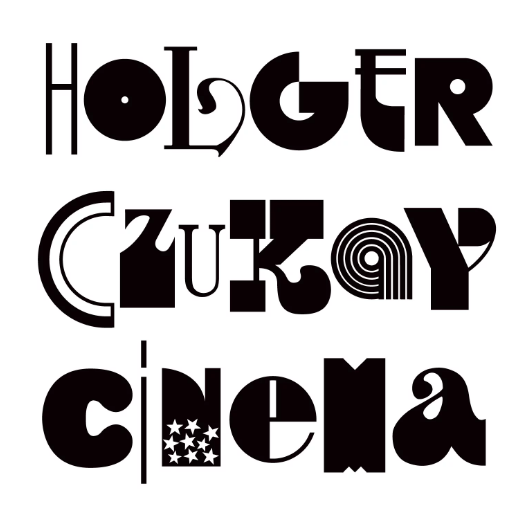This a sensitively curated survey of Czukay’s many-splendoured oeuvre, and it makes a good case for Czukay as the OG granddaddy of modern German music. Claims about the patterns of musical influence are of course dodgy and kind of boring, but it’s no big stretch to say that without Czukay as Can’s chief aural architect, punky noise, trance, ambient, trip-hop and hip-hop itself would not exist as we know them.
So we all owe a debt to the innovations of Holger Czukay. For one thing, if anybody invented modern sampling technology, it was Czukay (cue howls of protest), and he was incorporating it into his music in the 60s. A work done in collaboration with artist Rolf Dammers, The hauntingly moving Canaxis 5, his 1969 collaboration with artist Rolf Dammers, features snippets of Vietnamese music melded with medieval choral refrains interlaced with electronics, bass and other tape collage; it was recorded in his teacher Karlheinz Stockhausen’s Cologne studio.
When Can parted ways with Czukay in 1977 (his bandmates wanted a ‘better’ bass player; he wanted to start using shortwave radio, tapes and his own handmade analogue sampler constructed from a modified dictaphone), he made his move into the world of ‘acoustical landscape painting’. On his first post-Can solo album Movies, whose creation I watched during visits to Can’s Inner Space Studio in Weilerswist in 1978, Czukay further developed the process of painting with sound through editing, and produced music with a supremely visual quality. With the help of Liebezeit’s tight-terse drums, often subtly incorporating kaleidoscopic North African or Middle Eastern polyrhythms, Czukay built pieces that pulled in just everything: sports announcers, mariachi horns, Korean orchestras, warbling sopranos and Hollywood leading men, plus his own relaxed but clipped bass and whispery, characterful voice, and a crystalline guitar sound obtained by recording at half-speed.
Pre-digital recording/editing techniques on the first few solo albums found Czukay building his pieces like a puzzle in which everything is divided into near molecules, the mixes often ripped fast and rough. He’d mix each composition as many as 20 ways, then sample phrases from each mix and edit them back together. “This is the way of an artificially put-together piece,” he said. “Artificially in the sense of better than the original, or different and possibly better than the original.” Every phrase of Movies was painstakingly stitched together from numerous edits; the album as a whole is the product of several thousand edits, most of them via blade to magnetic tape. The results could be a funny, funky riot of international pop and ‘serious music’ sources (‘Cool in the Pool’), or a weepingly pretty sound-story drawn from an Iranian shortwave radio broadcast (‘Persian Love’). ‘Hollywood Symphony’ is a mysteriously epic aural account of a non-existing film. Its episodes are ambiguous –– snatches of movie dialogue, shortwave noise, stately string synth, plaintive but peculiar guitar, and hundreds of indiscernible sources braid into and out of each other, over a fuzzy-blanket bassline and Liebezeit’s variations on a coolly loping beat that propels yet can be felt or understood in many ways.
Movies’ complexities are stitched so deftly that it eventually establishes its own kind of sense, a symmetry resembling the logic of a dream. (“I’m an acoustic-electric landscape painter,” he told me, “but that landscape painting is trying to tell a story – not delivering a message.”) Hugely influential on its own, Brian Eno and David Byrne’s 1981 album My Life In The Bush Of Ghosts was heavily ‘inspired’ by Movies, a fact the pair acknowledged a few years after their album’s release. At least I think they did.
Czukay continued to develop his very personal aesthetics on several other solo albums and collaborations also included in the Cinema set, such as On The Way To The Peak Of Normal, Der Osten Ist Rot and Rome Remains Rome, as well as pair-ups with, among others, Jah Wobble, David Sylvian, Cluster, Japanese singer Phew, Czukay’s wife Ursula Kloss and soulmate wunderproducer Conny Plank (with the Plank on a hilariously horrifying and sonically stunning 12-inch credited as Les Vampyrettes).
To devise such a deeply personal and inviting musical symmetry is to destabilise established truths about structure, harmony, timbre and rhythm. Czukay, an amiably open-hearted fellow, liked to believe that his music would encourage listeners to ponder a tad why such disruption and individual aesthetic choice is of such vital importance, at least metaphorically. “You have to find the language and the pronunciation of the time you are living in,” he said. “The language of our time is the language of electronic music, of music which is so reduced somehow – you don’t paint a full picture, you just paint only some lines, and the people who listen to that, they make the rest of it.”
Much like Czukay himself, his music is about possibility, about humour as a tool; it is about intuition, about stops and starts and meanderings and being yanked back to the path, like the animal mind; it is about colossal bass sounds, glistening-squawking guitars and the Bulgarian Women’s Choir mudwrestling amid Holger’s French horn blats and Jaki’s tumbling toms, all chopped up, reordered and enhanced. Inside each piece lies global beauty and a sparkling in-your-faceness, and the eternal mystery of two notes from different places rubbing together for friction, interaction and a royal convergence in an only seemingly chaotic joy.
One day, in a Turkish cafe in Cologne, over plates of obscure fried organ meats and cups of sour milk, Holger Czukay summed up best what he searched for: “These things are not the type of ‘masterpieces’ that come by thinking and torturing your brain. That has nothing to do with creativity. These things are in the air, and you just grab at the right time. This idea is based on an ancient way of producing. Very effective, actually – there is a chance to be surprised by something, and accept something that was not to be foreseen.”



